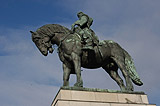Zizkov - where it got its name
 A relatively young part of Prague, traditionally an area of working-class livelihoods and a place of the symbolic conflict between the old crown city and the new urbanist one. Originally a plain hill which was later turned into a vineyard, Zizkov had to wait for its status of a town until 1881. The hill is called Vitkov and it was the place of a major 1420 battle between the Hussit warlord Jan Zizka and the king’s armies. The successful warlord’s name is the basis of the name of the whole quarter and the hill is dominated by a monument of his.
A relatively young part of Prague, traditionally an area of working-class livelihoods and a place of the symbolic conflict between the old crown city and the new urbanist one. Originally a plain hill which was later turned into a vineyard, Zizkov had to wait for its status of a town until 1881. The hill is called Vitkov and it was the place of a major 1420 battle between the Hussit warlord Jan Zizka and the king’s armies. The successful warlord’s name is the basis of the name of the whole quarter and the hill is dominated by a monument of his.
The Hussit movement, called after Jan Hus, a Czech priest burned alive for his critique of the Catholic Church in 1415, is still a controversial part of the Czech history. On one hand an act of courage and a will to go against the rich and powerful Church elite, on the other a massive rampage, which drowned its modern thoughts in blood.
It played a major role in the 19th Century, mainly its second half, as the Czech nationalists (patriots we would say today) used it often as an argument of the nation’s potential, as the Czechs, between 1419 and 1434, were able to frighten the elites of the whole Europe. On the other hand and sentiments aside, the Hussits and especially Zizka, were also responsible for numerous atrocities and unjustifiable cruelty, mainly towards monks and nuns of the conquered monasteries. The movement also brought sheer destruction to what we would today call “cultural heritage” and there are historians who claim it actually postponed the reformatory process. By being so brutal and radical the Hussits prepared fertile ground for the conservatives. All the anti- reformists had to do was point at the horrors of the berserk rebel armies and used it to discredit the movement altogether. The ideas of a church close to the common man, of the elites having to strengthen ties with the people, of some amount of religious freedom, could hardly have been rejected as easily.
In my opinion the key question lies on the same level as in the case of other revolutionary movements of the past centuries: the great difference between the ethos and the realization, the question whether such a cruel and remorseless chain of events could at all be seen positively. However a different case that is, I think the moral problem is in many ways similar to that of the French Revolution.
Ladronka Famous Prague people - Milos Forman, Madeleine Albright, Alfons Mucha